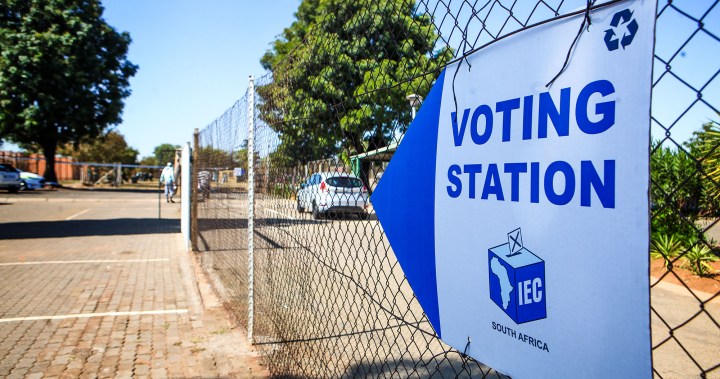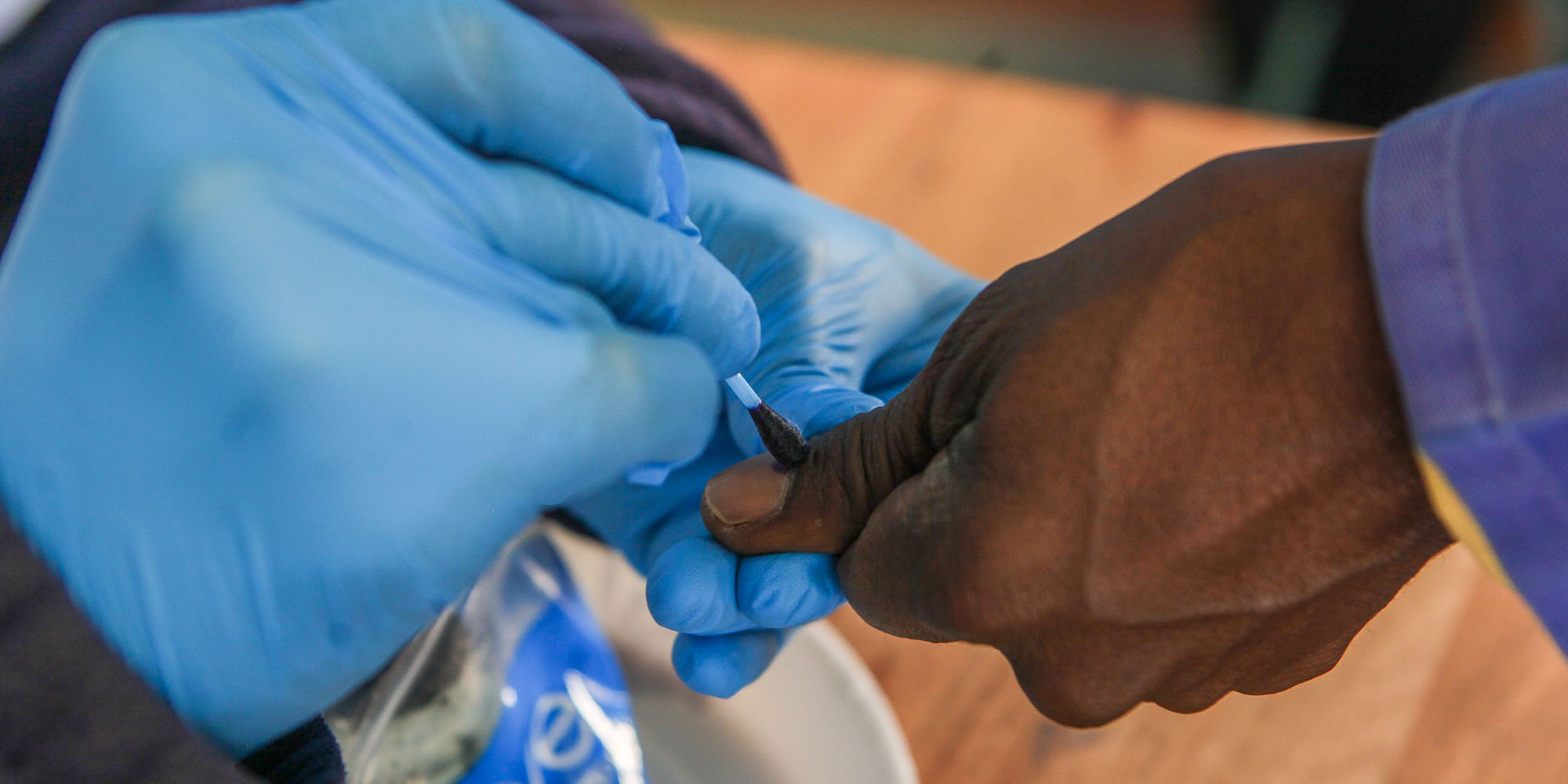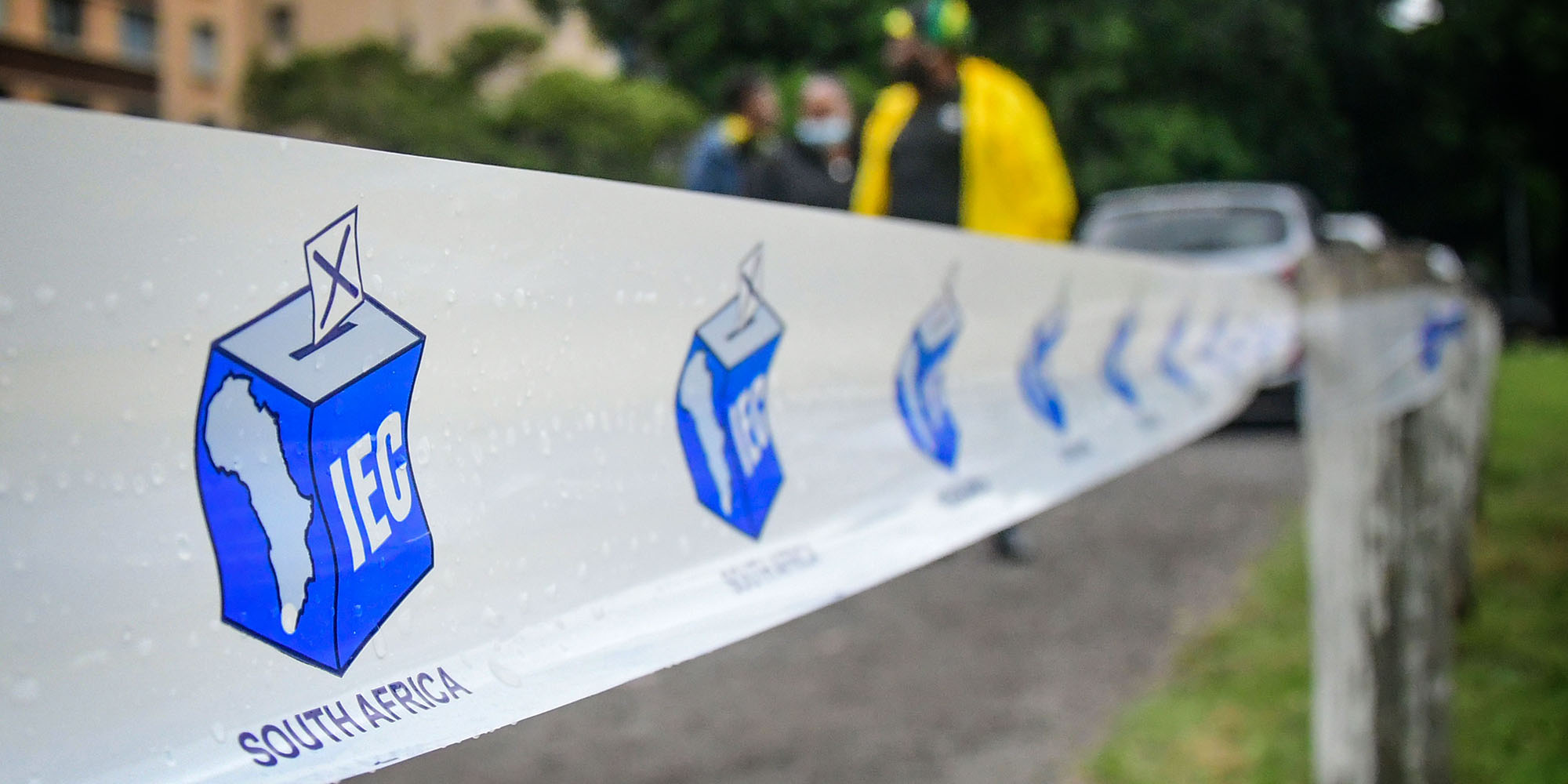ROAD TO 2021 LOCAL ELECTIONS
Welcome to the season of speed electioneering in times of distrust and Covid-19

There are 45 full campaigning days until the 1 November municipal elections. Amid this pressure, questions must be asked about voters’ distinct lack of trust in government institutions and political parties, voter turnout and the continuing Covid-19 lockdown.
The DA and the EFF have been quick off the mark, putting up posters and setting 25 and 26 September respectively to launch their municipal election manifestos of promises to voters. The IFP will follow on 30 September. But even speedier was the Good Party, with its election launch on 12 September, and three days earlier, Action SA.
Bolstered by tripling its parliamentary seats to 12 in the May 2019 poll, the Freedom Front Plus has put up posters – “Stand up, register AND vote” – in areas like Sea Point, Cape Town, which are not their traditional support bases.
It’s a sign that in this 2021 local government election anything and everything is up for grabs.
In the opposition books, the governing ANC is hamstrung by its failures to deal with corruption in both party and state, to deliver consistent and reliable services and to get South Africa out of the Covid-19 restrictions – Thursday is Lockdown Day 539 – to stop the jobs haemorrhage and revive economic growth.
A recent Ipsos survey signals this opposition optimism is misplaced: regardless of declining ANC numbers, it remains the most supported political party.
A snap poll in August showed the ANC support at 34.9%, down from 51.8% in December 2020, with the DA at 12.7%, compared to 10% in December 2020, and the EFF at 10.3%, compared to 10% in December 2020.
If an election were held tomorrow, the Ipsos survey showed seven out of 10 would vote – 49.3% for the ANC, 17.9% for the DA and 14.5% for the EFF.
“Door-to-door, that will be the style of our campaign throughout the country,” said ANC Deputy Secretary-General Jessie Duarte on 7 September in a televised briefing.
“We will be going to 4,861 wards, even wards that are strongholds of other political parties. We are not going to be afraid of putting our foot into every space.
“Don’t write us off just because we don’t have a lot of money.”
The ANC also reversed its previous claim that system glitches on the part of the Electoral Commission of South Africa (IEC) meant it could not register all its councillor candidates across all councils: “It’s not the IEC’s fault. In two areas the provincial list committees kept changing names.”
Duarte had set out a “firm, red and hard and uncompromising” deadline to resolve all councillor nomination disputes by 11am on Saturday, 11 September. But when that deadline seemed to have passed, and media reports pointed that out, the ANC issued a statement saying that what it called “missing of deadline” did not arise.
“A letter from Deputy Secretary-General, Comrade Jessie Duarte, makes it clear that in the event that certain disputes have not been resolved on time, these will be attended to beyond the 1stof November 2021,” said ANC national spokesperson Pule Mabe in the statement of 14 September.
Effectively, with this approach the ANC has opened the door to continuing tensions beyond election day – and the spectre of ANC factional fights hobbling and destabilising the new municipalities.
South Africa’s local government can ill-afford this.

A voter’s thumb is inked at a Johannesburg polling station. IEC stats show that voter turnout in 2016 rose to 57.9% nationally, slightly more than 2011, but significantly more than the 48% turnout for the 2000 and 2006 municipal polls. (Photo: Gallo Images/Sharon Seretlo)
The Auditor-General’s 2019/20 municipal audit gave only 27 of 257 councils a clean audit, re-emphasising the perennial reasons of a lack of political and administrative leadership and lack of consequences for wrongdoing.
Wracked by financial maladministration and service delivery failures, municipalities are also the least-trusted government institution.
According to Afrobarometer in August, trust in institutions is down and declining. And at the bottom is local government – trusted “somewhat” or “a lot” by only 24%.
Opposition parties also find themselves at 24% trust levels, followed by the police at 26%, the ANC at 27%, Parliament at 28% and the president at 38%.
A red flag over the health of South Africa’s constitutional democracy must be the Afrobarometer finding that, “Two-thirds (67%) of South Africans would be willing to give up elections if a non-elected government could provide security, housing, and jobs. Nearly half (46%) say they would be ‘very willing’ to do so, with higher levels of support among younger and more educated respondents.”
The 2021 findings are not far off from what Afrobarometer found in a longitudinal survey ahead of the 2016 municipal poll.
Trust in local government had dropped from 43% in 2006 to 35% in 2015, with trust in the ANC dropping from 61% to 43% and trust in the president declining from 69% to 34% over the same timeframe.
The IEC’s own research bears out these trends.
The 2015/16 Voter Participation Survey showed 48% of citizens were dissatisfied with their municipality’s performance, 21% were neutral and only 30% were satisfied.
“This represents a more sombre view than was the case ahead of the 2011 local government elections, when 45% of citizens were dissatisfied and 39% were satisfied with their municipality,” according to the IEC municipal election report.
Performance and trust are not quite the same, it emerged, with this survey showing trust in local government between 2013 to 2015 rose slightly to 36%, from 34%, but it remained the lowest of all three spheres of government. In comparison, trust in national government stood at 46% in 2015, provincial government at 47% and Parliament at 38%.
And this municipal satisfaction lag dates back well over 15 years, as the HSRC/IEC survey showed in 2005.
And yet voters turn out to cast their ballots. In increasing numbers, according to the IEC stats, which show that voter turnout in 2016 rose to 57.9% nationally, slightly more than 2011, but significantly more than the 48% turnout for the 2000 and 2006 municipal polls.
The reasons why people are determined to vote could include hope to ensure improvements – or the political issues are at stake.
Ahead of the 2016 local government elections, civil society was highly mobilised against corruption and State Capture.
That the ANC in the 2016 municipal poll lost key centres – South Africa’s economic hub, Johannesburg, the administrative capital, Tshwane, and the Eastern Cape economic heartland of Nelson Mandela Bay – was largely seen as voters punishing the governing party. Not only for State Capture, but also the dragged-out Nkandla saga – the R215-million-plus of taxpayers’ money spent on security upgrades at the Zuma rural homestead that included a swimming pool, cattle kraal, chicken run and amphitheatre
But other more local factors would also have been at play. The ANC’s loss of outright control in Rustenburg, the central hub of the Platinum Belt, is enmeshed with the August 2012 Marikana massacre when police killed 34 striking Lonmin miners. The ANC only stayed in charge there through a coalition with a community organisation.
A coalition was also needed in Ekurhuleni, where the ANC had dropped to 48.6% in the 2016 municipal elections, down from 61.63% in the 2011 poll, according to the IEC stats.
Broadly speaking, the higher the voter turnout, the more the opposition parties benefit, particularly if the ANC fails to bring out its voters, whether that’s due to disinterest, or factional considerations because the ward councillor was “imposed” as the ANC lingo goes.
The DA, in particular, is well versed in the benefits of getting its voters out. In Cape Town in 2016 the DA scored a two-thirds majority on the back of a 64.2% voter turnout. That’s better than the 60.9% support it gained in 2011 on the back of a similar voter turnout – precisely because the rise in DA voters casting their ballots in 2016 coincided with a decline in ANC voters casting their ballots, even in traditional heartland wards such as Gugulethu, Nyanga and Khayelitsha.

Broadly speaking, the higher the voter turnout, the more the opposition parties benefit, particularly if the ANC fails to bring out its voters. (Photo: Gallo Images / Darren Stewart)
A similar trend emerges from the IEC stats for Johannesburg, where in 2016 the ANC lost control after plummeting to 44.5%, down from 58.5% in 2011. The voter turnout increase to 57% in 2016 from 54.9% in 2011 alone does not explain this; nor does the DA’s increased support to 38.4% in 2016, up from 34.6% in 2011.
Crucially, in 2006 the 40.4% voter turnout gave the ANC 62.3%, and the DA 27% in Johannesburg.
Voter turnout affects outcomes from wards and colours national political trends, but this indicator of electoral appetite must be qualified.
The IEC registered some eight million more voters between the 2000 municipal election – the first with the current local government system – and the 2016 poll. Over this time, the voters’ roll increased from 18,476,516 to 26,333,353 in 2016. However, this represents around 60% of eligible voters, or any South African aged 18 and older. And even a 57% turnout – high for a municipal poll on international levels – means only a minority of potential voters are participating in determining who runs councils.
Crucially, questions must be asked as to why young people, particularly first-time voters, seem reluctant to register, never mind vote. Only 44,079 South Africans aged 18 and 19 are registered voters, according to the IEC, alongside 7.34% of men and 8.78% of women aged 20 to 29.
For a constitutional democracy in a country where young people dominate, this must be a red flag.
But given the 2021 municipal poll campaign pressure – of time, money, public distrust and Covid-19 safety protocol – political parties’ focus is set to be firmly on chasing votes. Much is at stake. DM
[hearken id=”daily-maverick/8671″]
"Information pertaining to Covid-19, vaccines, how to control the spread of the virus and potential treatments is ever-changing. Under the South African Disaster Management Act Regulation 11(5)(c) it is prohibited to publish information through any medium with the intention to deceive people on government measures to address COVID-19. We are therefore disabling the comment section on this article in order to protect both the commenting member and ourselves from potential liability. Should you have additional information that you think we should know, please email [email protected]"















 Become an Insider
Become an Insider